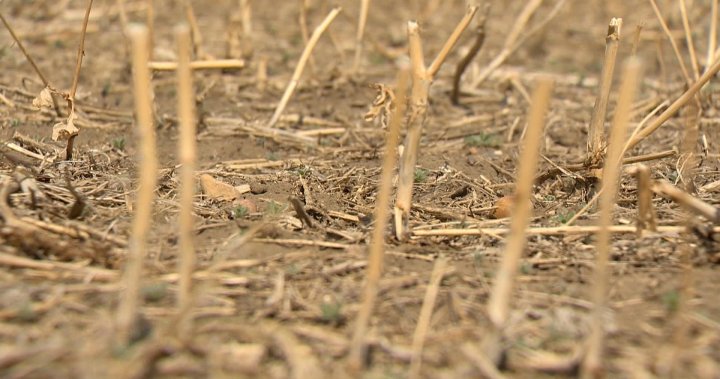As late summer sun bakes the parched earth across southern Saskatchewan, desperate farmers are facing a grim reality that has now escalated to official emergency status. This week, eight rural municipalities formally declared agricultural disasters as devastating drought conditions threaten to wipe out crops and livestock operations across the region.
“I’ve never seen anything like this in my 35 years of farming,” says Warren Kaeding, who serves as both a grain producer and reeve of the RM of Churchbridge. “Fields that should be golden with wheat are just brown dust. Folks are making impossible choices about which animals they can afford to keep.”
The emergency declarations came after rainfall totals hit historic lows, with some areas receiving less than 40 percent of normal precipitation since April. According to Environment Canada data, the Regina area has recorded just 87.1 millimeters of rain since April 1st, far below the seasonal average of 219.4 millimeters.
The Agricultural Producers Association of Saskatchewan reports that soil moisture conditions have reached critically low levels across nearly 70 percent of agricultural land in the southern part of the province. Dugouts and wells are drying up, forcing producers to haul water for livestock—an expensive and unsustainable solution as the crisis deepens.
Premier Scott Moe acknowledged the severity of the situation during a press conference in Regina yesterday. “We recognize the extraordinary hardship our agricultural communities are facing. This drought isn’t just a farm issue—it affects our entire provincial economy and the food supply chain Canadians depend on.”
The provincial government has pledged $15 million in emergency assistance for affected producers, but many farmers say this falls dramatically short of addressing the scale of the disaster. The aid package includes subsidies for water infrastructure development and transportation assistance for producers forced to relocate herds.
In the small community of Gravelbourg, the crisis has moved beyond the fields and into town. Local hardware store owner Marie Dupuis says the impact reverberates throughout the local economy. “When farmers hurt, we all hurt. I’ve seen my sales drop nearly 40 percent as folks tighten their belts. This isn’t just about this year’s crop—this is about whether some family farms will survive at all.”
The severity of the drought has surprised even veteran agricultural scientists. Dr. John Pomeroy, director of the Global Water Futures Program at the University of Saskatchewan, links the conditions to broader climate patterns. “What we’re witnessing aligns with climate models that predict more frequent and intense drought cycles for the prairie region. The concerning part is how rapidly conditions deteriorated this year.”
Cattle producers have been particularly hard hit. The Saskatchewan Stock Growers Association estimates that without substantial rainfall soon, the province could lose between 20 to 30 percent of its breeding herd as producers are forced to sell animals they can no longer feed or water.
“Yesterday I watched my neighbor load his entire herd—animals his family has selectively bred for three generations—onto trucks headed for auction,” says Marla Tondevold, who operates a mixed farm near Assiniboia. “He couldn’t afford $400 a day to haul water anymore. There were tears in his eyes as those trucks pulled away.”
The crisis has also highlighted infrastructure vulnerabilities. Rural water systems designed decades ago weren’t built to withstand the combined pressures of population growth and climate extremes. Several communities now face potential drinking water shortages as reservoir levels continue to fall.
Federal Agriculture Minister Lawrence MacAulay has promised to fast-track assistance through AgriRecovery, the disaster relief framework designed for exactly these scenarios. However, bureaucratic processes mean actual support may still be weeks away.
Meanwhile, indigenous communities in the region face compounded challenges. Chief Cadmus Delorme of Cowessess First Nation points out that historical inequities in water infrastructure have left his community particularly vulnerable. “Our water systems have always been underfunded. Now with these conditions, we’re seeing elders and children affected first, as always happens in these emergencies.”
Mental health supports have been deployed throughout affected areas, with Saskatchewan Health Authority expanding telehealth services for farm families. Rural crisis lines report a 60 percent increase in calls since June, many related to financial stress and feelings of hopelessness.
“The psychological toll cannot be overstated,” says Dr. Angela Robinson, a rural mental health specialist. “Farmers are watching their livelihoods disappear despite doing everything right. That creates a profound sense of helplessness that can lead to serious mental health consequences.”
As fall approaches, the emergency declarations serve as both a call for assistance and a warning that Saskatchewan’s agricultural heartland faces a defining crisis. The decisions made in the coming weeks will shape not just this year’s harvest, but the future of farming communities across the southern prairies.
For now, farmers like Kaeding continue daily rituals—checking empty rain gauges and scanning cloudless horizons—while making the painful calculations that drought forces upon them: which fields to abandon, which animals to sell, and how to survive until next spring brings the hope of renewal.






